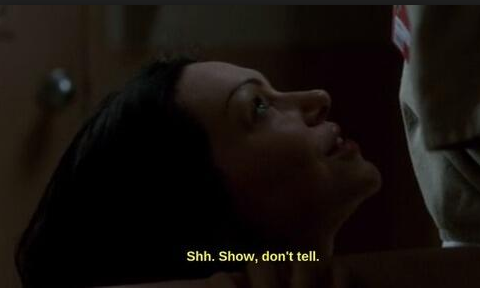Showing and Telling
Tantz_Aerine at March 10, 2018, midnight

Anyone who ever dabbled in creative writing or any sort of narrative work, had the phrase "show, don't tell" hammered into them. The sheer anxiety of being caught 'telling' rather than 'showing' made us all think in terms I assume only exhibitionists do.
The truth though is, that sometimes telling is absolutely imperative in order to be able to show things in a way that the audience will care.
The trick is to dress up all the telling in the trappings of a show.
The easiest rule of thumb is "if it sounds like a lesson, it's got to go". Nobody wants to feel like they're reading something that will be on the test, be it in comics, books or movies. Nobody wants to feel like they're working to remember or learn information in order to be able to understand the plot. That level of immersion in data and trivia comes when the audience is already a fan, and not during the movie, or the show, or the comic- i.e. not during the main attraction.
So how do you go about infodumping without it being an infodump?
The first thing to consider is how much of it you'll need to do. If it is a lot, if the audience needs to be introduced into a whole new world, then consider the strategy of the "naive main character": a character that is just as alien and unfamiliar with the environment and the world you have created as the audience is.
As that character comes in contact with the world, he/she will ask the questions the audience would ask, and deal with issues and problems and obstacles that come with this ignorance, gradually learning about the world with the audience. In this manner, the process of learning about the world is what IS the plot, at least for a first arc, or a first act. It makes learning the info interesting, relevant and fun.
This 'naive' character doesnt need to be a literal newcomer to the world. He/she may be a child, or a sheltered person, or someone from a different social class, or from a different area in the world. The character only needs to be uninformed enough (or incorrectly informed enough) to present with situations where the information needed to be communicated, is.
Another strategy for infodumping in an entertaining way is to create a situation where characters that already know of the world need to act, interact and react in ways that aren't typical, and will be designed to showcase the information that needs to be imparted: a disaster situation where rescuing and damage control need to take place is ideal for practical characters to break rules that ruffle feathers, and in the arguments that ensue, teach the audience about the world they are being immersed in without it seeming like the plot is screeching to a halt in order for a lesson to take place.
Another way is for situations where a character narrating is such that it is normal, expected and advances the plot rather than forces it to stop. A parent consoling a child by explaining or giving examples that at the same time give the audience much needed info, a teacher addressing a class with a warning or a praise, a school yard fight between kids about something, and so on and so forth.
All in all, what you need as a creator to do, is make sure the plot stops for nobody. All the rest is going to take care of itself.


Comments
Please login to comment.
Login or Register${ comment.author }} at
${ comment.author }} at